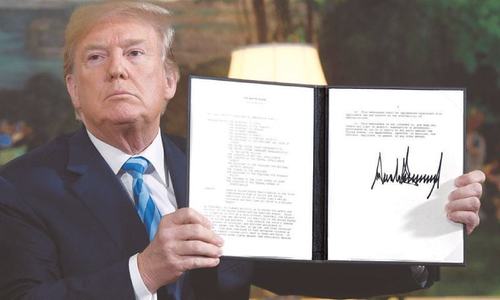GENEVA: The United States hinted on Thursday it might withdraw from a landmark Cold War nuclear arms reduction treaty if Russia does not stop “violating” the accord.
Washington has complained for nearly two years that a ground-launched missile system deployed by Russia breaches the 1987 Intermediate Nuclear Forces Treaty (INF).
“This situation is untenable, and we have to take measures to deal with this continued violation of this very important treaty,” US ambassador on disarmament Robert Wood told reporters in Geneva.
He said that pushing Russia to “come back into compliance” with the INF would be a top US priority at disarmament meetings at the United Nations in New York next week.
But he added: “I just don’t know how much longer we can continue to live up to our obligations under this treaty with Russia violating this treaty so blatantly and openly.” Russia has repeatedly insisted its 9M729 missile system does not breach the treaty, but Wood said Moscow had long denied the weapon even existed.
“The Russians continue to obfuscate, deny, because this is what they do best,” he said.
His comments came after the US ambassador to Nato, Kay Bailey Hutchison, said on Tuesday that Washington was looking to “take out the missiles that are in development by Russia”.
She later clarified that she was not suggesting the United States would launch pre-emptive strikes on Russia, but underlining the need for Western allies to find ways to counter any escalation.
Nato leaders have also raised concerns about the 9M729 system, and have urged Moscow to engage in dialogue to ensure the future of the INF treaty.
On Wednesday, Nato chief Jens Stoltenberg demanded that Moscow prove it is complying with the treaty, which was signed by US president Ronald Reagan and Soviet leader Mikhail Gorbachev in 1987.
It abolished a whole class of missiles with a range of between 500 and 5,500 kilometres, and put an end to a mini-arms race in the 1980s triggered by the Soviet Union’s deployment of SS-20 nuclear missiles targeting Western European capitals.
Published in Dawn, October 5th, 2018













































